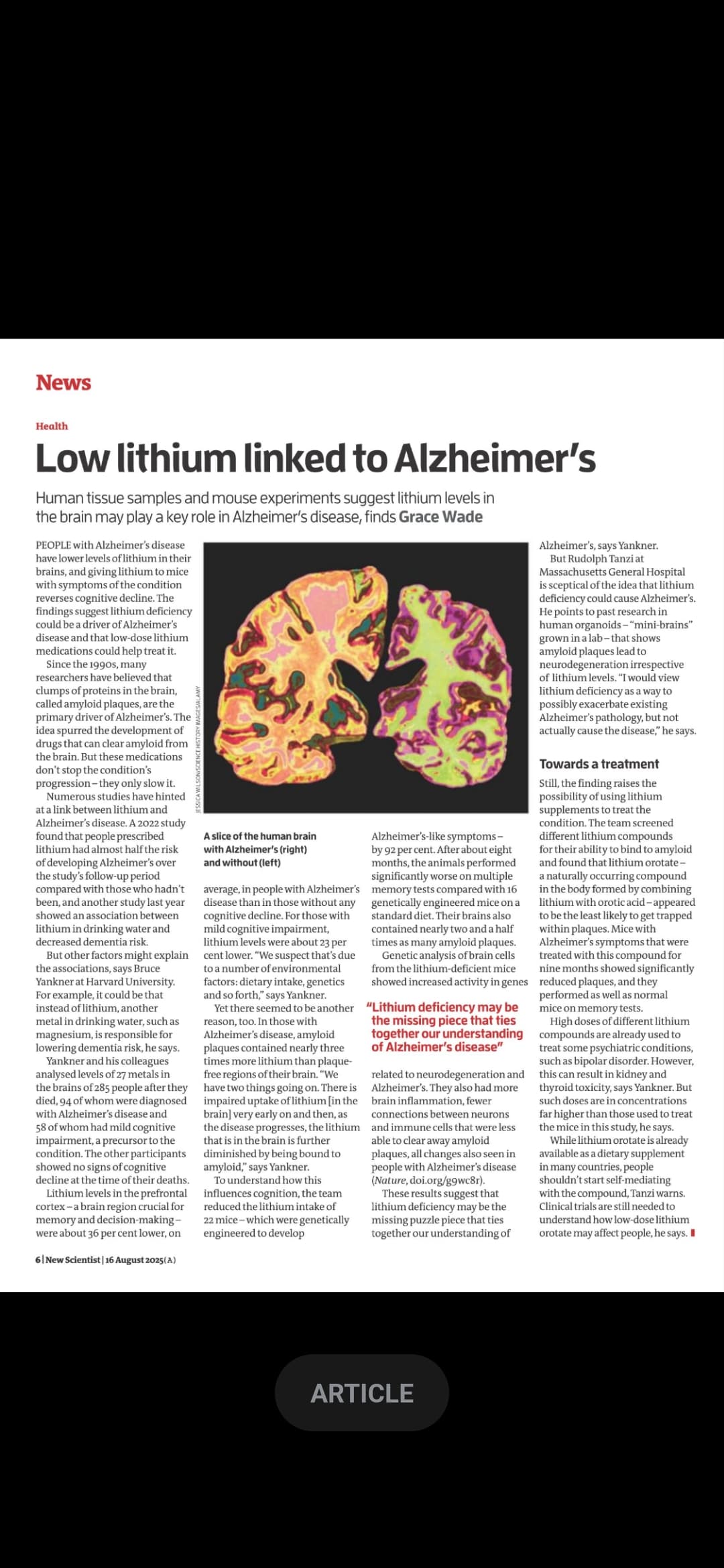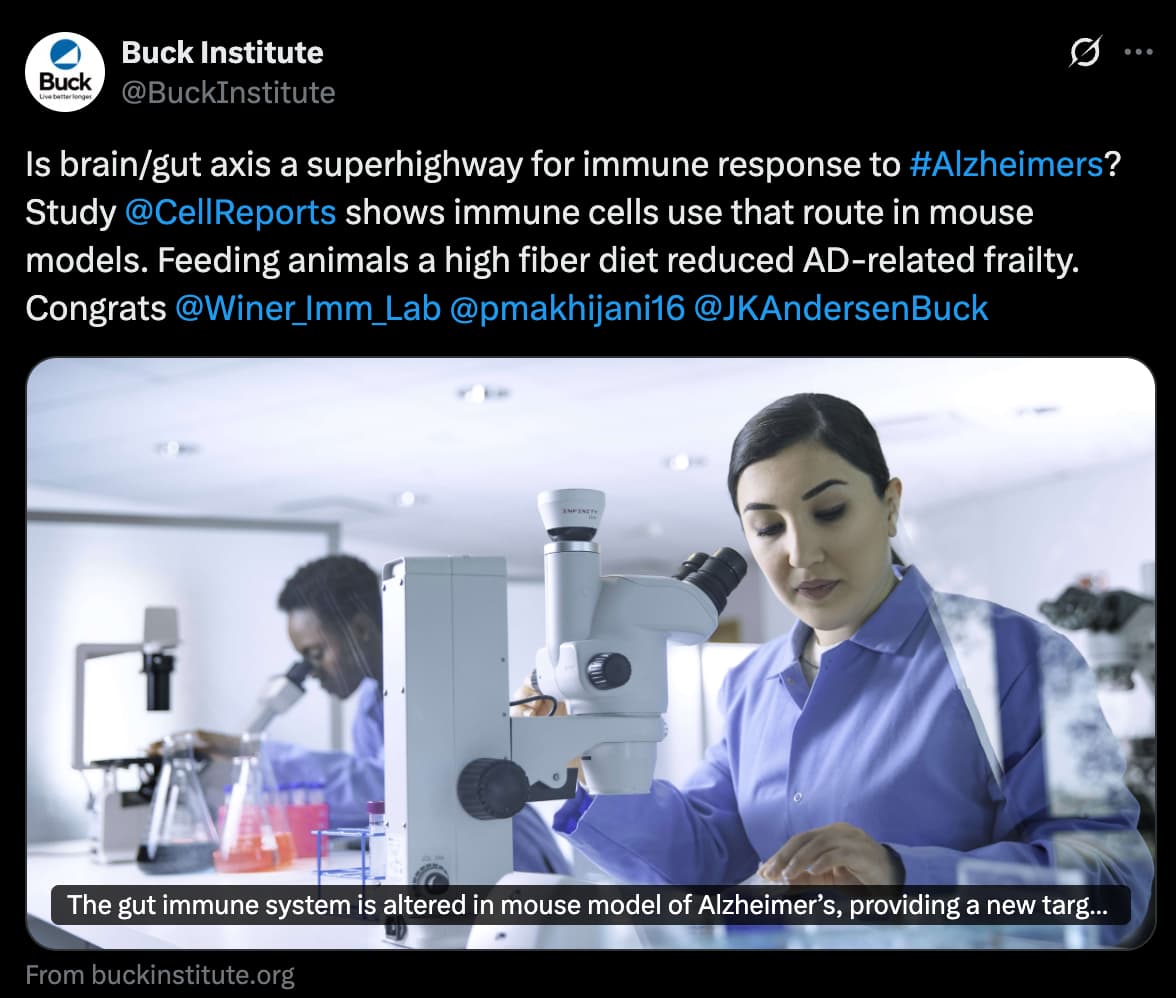Also discussed there:
low dose lithium orotate would seem to be a no-brainer
Cerebrospinal fluid lipoprotein-mediated cholesterol delivery to neurons is impaired in Alzheimer’s disease and involves APOE4
https://www.jlr.org/article/S0022-2275(25)00127-0/fulltext
Pop sci article:
Scientists Uncover Hidden Link Between Cholesterol Flow and Alzheimer’s Disease
Lead researcher Mary Ni Lochlainn, King’s College London (KCL), and colleagues asked whether adding a daily prebiotic to a modest protein supplement and light resistance exercise could affect cognition in older twins.
The team enrolled 36 pairs, each aged 60 or older, and assigned one twin to inulin plus fructooligosaccharides while the co-twin received a placebo, all under double blind conditions.
Everyone received the same branched chain amino acid protein powder and simple at home strength moves.
The 12 week protocol ran remotely using video visits, online questionnaires, and posted kits for cognitive testing and stool samples.
The twin design reduced genetic and early environmental noise. That choice made any between twin differences more likely to reflect the supplement rather than family background or shared habits.
Fructooligosaccharides and memory
The prebiotic group scored higher on a combined cognition factor and made fewer errors on the PAL test, a visual paired associated task sensitive to early Alzheimer’s related change.
That pattern fits with decades of work showing PAL detects subtle episodic memory problems before many standard clinic scales do.
“We are excited to see these changes in just 12 weeks. This holds huge promise for enhancing brain health and memory in our ageing population,” said Dr. Lochlainn.
The specific test improvement matters because paired associates learning taps the ability to form new connections between locations and patterns.
That is a core function that erodes early in Alzheimer’s, so even small gains on this task are notable in people over 60.
Open access paper:
Effect of gut microbiome modulation on muscle function and cognition: the PROMOTe randomised controlled trial
Abstract
Studies suggest that inducing gut microbiota changes may alter both muscle physiology and cognitive behaviour. Gut microbiota may play a role in both anabolic resistance of older muscle, and cognition. In this placebo controlled double blinded randomised controlled trial of 36 twin pairs (72 individuals), aged ≥60, each twin pair are block randomised to receive either placebo or prebiotic daily for 12 weeks. Resistance exercise and branched chain amino acid (BCAA) supplementation is prescribed to all participants. Outcomes are physical function and cognition. The trial is carried out remotely using video visits, online questionnaires and cognitive testing, and posting of equipment and biological samples. The prebiotic supplement is well tolerated and results in a changed gut microbiome [e.g., increased relative Bifidobacterium abundance]. There is no significant difference between prebiotic and placebo for the primary outcome of chair rise time (β = 0.579; 95% CI −1.080-2.239 p = 0.494). The prebiotic improves cognition (factor score versus placebo (β = −0.482; 95% CI,−0.813, −0.141; p = 0.014)). Our results demonstrate that cheap and readily available gut microbiome interventions may improve cognition in our ageing population. We illustrate the feasibility of remotely delivered trials for older people, which could reduce under-representation of older people in clinical trials. ClinicalTrials.gov registration: NCT04309292
Thx, I forwarded your article to my eye doc and he shared this related paper:
“Biomarkers from retinal OCTA images can provide useful information for clinical decision-making and diagnosis of AD and MCI.”
Apparently he has been taking OCTA images on my eyes (who knew!?!). He has been doing it with the idea that once he acquires the ability, he will go back to our past results and use AI algorithms to pick up early signs of dementia.
(He’s Bay Area for anyone local who interested).
Today I had the back of my eyes and retinas photographed - small healthy blood vessels - nothing out of place. No cateract development, optic nerve great. Cost was $39. Cheap.
After seeing this article on eye exams - glad I paid the small extra for pics over the free look - drops to dialate and look. Like having a record for any future changes is great…
Glad you had the test and that is an excellent price!
Also, PSA: I had not had my eyes dilated in many years, but I actually met someone who had eye cancer and then passed… a simple eye exam would have found it early.
My doc found a tiny spot on my eye and sent me to Stanford just to make sure it was nothing, and now I go every year.
More on the amazing supplement lithium orotate.
Lithium deficiency may be the hidden spark behind Alzheimer’s | ScienceDaily
Regarding the article “More than simply leftovers: a new link between remnant cholesterol and dementia” posted by @A_User, I wanted to see where my lipids put me, compared to the people in this study. In case anyone else is interested in doing this, below is the information that I used.
The article states:
When the population was stratified by remnant-C quartiles, higher remnant-C concentrations were incrementally associated with higher risks of developing all-cause dementia, Alzheimer’s disease, and vascular dementia after adjusting for age, sex, and additional confounders such as income level, BMI, comorbidities, statin and fibrate use, and total cholesterol concentration.
Per Wikipedia:
Remnant cholesterol corresponds to all cholesterol not found in high-density lipoprotein (HDL-C) and low-density lipoprotein (LDL-C). It is calculated as total cholesterol minus HDL-C and LDL-C.
The full text of the paper on the study covered in the article is linked from PubMed: Association of remnant cholesterol with risk of dementia: a nationwide population-based cohort study in South Korea - PubMed.
The quartiles in this study have the following mean (SD) remnant-C values, in mg/dL (from table 1 in the paper):
Quartile 1: 14.66 (1.83)
Quartile 2: 19.49 (1.33)
Quartile 3: 24.67 (1.74)
Quartile 4: 35.53 (6.62)
If you don’t fall in quartile 1, you may want to examine table 2 in the paper for hazard ratios.
In most cholesterol panels, LDL-C is estimated as Total - HDL - Triglycerides/5. This means remnant cholesterol is the same as Triglycerides/5 and hence a proxy for Triglyceride levels.
The best way to lower Triglycerides is to raise Omega-3, so it is not suprising this corelates with risk of dementia.
Short summary:
- Claim in one line: The video argues that Viagra (sildenafil) might lower Alzheimer’s risk, but current evidence is observational and not proof of causation.
- Key evidence #1 (2021): A Cleveland Clinic–led analysis of ~7.2M U.S. insurance records linked sildenafil use with a 69% lower Alzheimer’s incidence over ~6 years; mechanistic lab work suggested effects on tau pathology.
- Key evidence #2 (2024): A UCL–led cohort of ~270k U.K. men with ED found those prescribed PDE5 inhibitors had an 18% lower Alzheimer’s risk; the association strengthened with more prescriptions.
- Drug-specific nuance: Some analyses report the signal mainly for sildenafil rather than for the whole PDE5I class.
- Proposed mechanisms: PDE5 inhibition raises cGMP, improving cerebrovascular function; preclinical work hints at effects on tau/amyloid pathways and neuronal health.
- Limits & biases: All human data so far are observational—susceptible to confounding (e.g., health-seeking behavior, ED severity, comorbidities). No randomized prevention trials yet; results don’t prove Viagra prevents Alzheimer’s.
- Generalizability: Evidence mainly involves men with erectile dysfunction; relevance to women or to people without ED is unknown.
- Safety considerations (if anyone considers off-label use): Never combine with nitrates, as this may increase the risk of hypotension. Rare reports of hearing or vision loss; interactions with alpha-blockers/strong CYP3A inhibitors warrant caution—discuss with a clinician.
- Bottom line: Sildenafil is a promising repurposing candidate for Alzheimer’s prevention, but clinical trials are needed before recommendations can be made.
There are some interesting observations in the video that are not covered in the summary.
Most of the readers of this thread are already aware of the contents.
FWIW:
Among PDE5I medications, only sildenafil use was associated with significant risk reduction (most likely because of the small sample size for the other 2 drugs, tadalafil and vardenafil).
A meta-analysis:
https://www.nature.com/articles/s44400-025-00005-3
https://www.nia.nih.gov/news/viagra-associated-reduced-risk-alzheimers-disease
It depends on the underlying problem, I’ve seen insulin resistance mentioned often in the case of high triglycerides.
(And often that could be from excess “above fat threshold” pancreas fat storage – for the average person GLP-1 agonists would remedy this).
Sweeteners found in yoghurts and fizzy drinks can damage people’s ability to think and remember, and appear to cause “long-term harm” to health, research has found.
People who consumed the largest amount of sweeteners such as aspartame and saccharin saw a 62% faster decline in their cognitive powers – the equivalent to their having aged 1.6 years, researchers say.
They concluded: “Our findings suggest the possibility of long-term harm from low- and no-calorie sweeteners (LNCs) consumption, particularly artificial LNCs and sugar alcohols, on cognitive function.”
The study published in Neurology examined the diets of more than 12,700 adults in Brazil, and found that those who consumed the highest amounts of low- or no-calorie sweeteners experienced faster declines in memory and thinking skills over an eight-year period.
Paywalled Paper:
Association Between Consumption of Low- and No-Calorie Artificial Sweeteners and Cognitive Decline - An 8-Year Prospective Study
Press: The gut immune system is altered in mouse model of Alzheimer’s, providing a new target for therapeutics: Feeding the animals a high fiber diet reduced Alzheimer’s-related frailty including tremor
Paper: Amyloid-β-driven Alzheimer’s disease reshapes the colonic immune system in mice
To determine whether rescuing inflammatory phenotypes within the AD gut could constitute a potential therapeutic, we utilized the dietary supplement, inulin. Inulin is a soluble prebiotic fiber and, in our study, altered serum levels of bioactive metabolites, including SCFAs,119 bile acids,36 and IPA,39 correlating to an increase in Actinobacteria phyla and Bifidobacteriaceae family species among some others. […] Overall, inulin diet rescued some parameters of AD, likely via multiple mechanisms acting on the gut, the brain, and the peripheral immune cells. […] Through this investigation, we provide further evidence for the importance of the gut-brain axis, including the role of gut immune cells, and reveal possible dietary and therapeutic interventions to target inflammation in AD."
@DrFraser @John_Hemming: example of a neuroprotective intervention (in mice) that does not cross the BBB.


